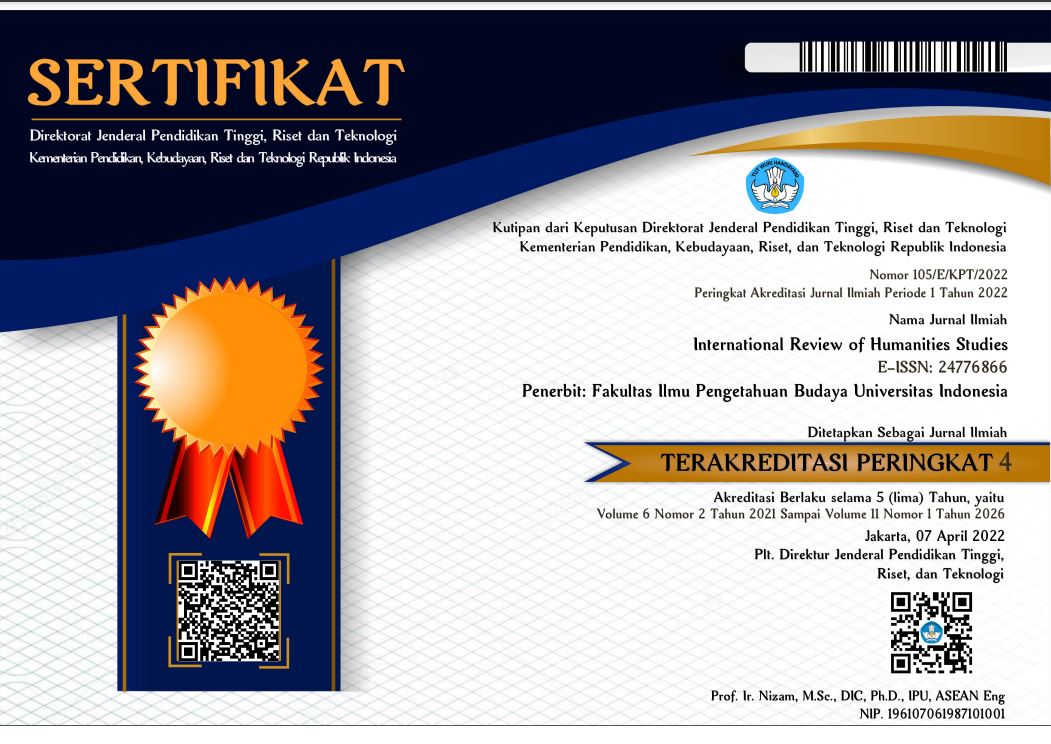International Review of Humanities Studies

Abstract
The paper assesses the issue of terrorism as a social reality present in the Nigerian state from its origination and the questions treated by the paper among others include: what dimensions did the occurrences of terrorism take on Nigerian socio-political sphere? What are the counter measures taken by individual and groups in dealing with state organized terrorism? What are the dimensions state organized terrorism take in the modern Nigerian state? Lekan Balogun‟s Ogun Skugga is used primarily while other literary works are used to supplement. The paper argues that the state organized terrorism was a surreptitious method of coercion adopted by the colonial authorities equally and eventually adopted by the political elites after independence. It also maintains that individual and groups engaged in subtle and overt terrorism as counter measure against state sponsored terrorism. Again, current acts of terrorism organized by state are multidimensional so also are variables presented by ethnic, tribal and political inclinations which in turn stimulate approaches by individual and groups in counter measures. The importance of this work is the perspectives it presents from history and drama to assess the issue of terrorism and its relevance to modern Nigerian society.
References
Adeoye, F. (2008). “Language of Terror: Perspectives from the Global South” in Global Understanding in the Age of Terrorism, eds. Olukoju, A. and Falaiye, M. Lagos: University of Lagos Press.
Ajikobi, D. (2007). Verbal Art: A Promising Mountain of Gold. Ibadan: Kraft Books Limited. Balogun, L. “Ogun Skugga” a severally performed unpublished play.
Brockett, O. & Hildy, F. J.(2010) History of the Theatre(10th Edition)NY,Boston: Pearson Education, Inc. Davies, J. L. and Gurr, R. Preventive Measures Building Risk Assessment and Crisi Early Warning Systems. New York: Rowman and Littlefield Publishers, Inc.
Ezenwanebe, Osita. (2008). “The Language of Terror and the Terror of Language in Postmodernist Drama” in Global Understanding in the Age of Terrorism, eds Olukoju, A. and Falaiye, M. Lagos: University of Lagos Press.
Freeman-Grenville, G.S.P. (1978).Chronology of World History. London:Rex Collings. Fromm, E. (1964). The Heart of Man. New York: Harper and Row edition.
Gerbner, G. (1988). Violence, and Terror in the Mass Media. France: UNESCO.
Greenwald, M.and Schultz, R. et al. (2001)The Longman Anthology of Drama and Theatre. New York: Addison-Wesley Educational Publishers Inc.
Hibberd, D. (1990).The First World War. London: Macmillan Educational Ltd. Hoffman, B.(2006). Inside Terrorism. New York: Columbia University Press. edition.
Karber, P. (1971)Urban Terrorism: Baseline Data and a Conceptual Framework. Social Science Quarterly 52. New York. Lewis, B. (1967). The Assassins. Oxford University Press.
Mannik, E. (2007). Terrorism: its Past, Present and Future Prospects. KVUOA Toimetised. 151 – 172.
Majekodunmi, A. (2015). “Terrorism and Counter-Terrorism in Contemporary Nigeria: Understanding the Emerging Trends.” Journal of Policy and Development Studies Vol. 9, No. 4, August 2015.
Metzner, R. (2008). The Roots of War and Domination. Berkeley CA: Green Earth Foundation & Regent Press
Omede J & Andrew O. (2015). “Terrorism and Insecurity in Nigeria: Moral, Values and Religious Education as Panaceas.” Journal of Education and Practice, Vol.6, No.11, 2015. 120 – 126
. Quirk, H, Seddon T. et al. (2010)Regulation and Criminal Justice Developing a New Framework for Research and Policy Development. New York: Cambridge University Press.
Recommended Citation
Ademakinwa, Adebisi and Bello, Saheed
(2023)
"ICONOCLASTS AND COUNTER TERRORISM AGAINST STATE ORGANIZED TERROR: A STUDY OF PERSPECTIVES IN NIGERIAN HISTORY AND DRAMA,"
International Review of Humanities Studies: Vol. 4:
No.
1, Article 17.
Available at:
https://scholarhub.ui.ac.id/irhs/vol4/iss1/17
Included in
Africana Studies Commons, African Languages and Societies Commons, Classics Commons, Comparative Literature Commons, Life Sciences Commons, Social and Behavioral Sciences Commons



